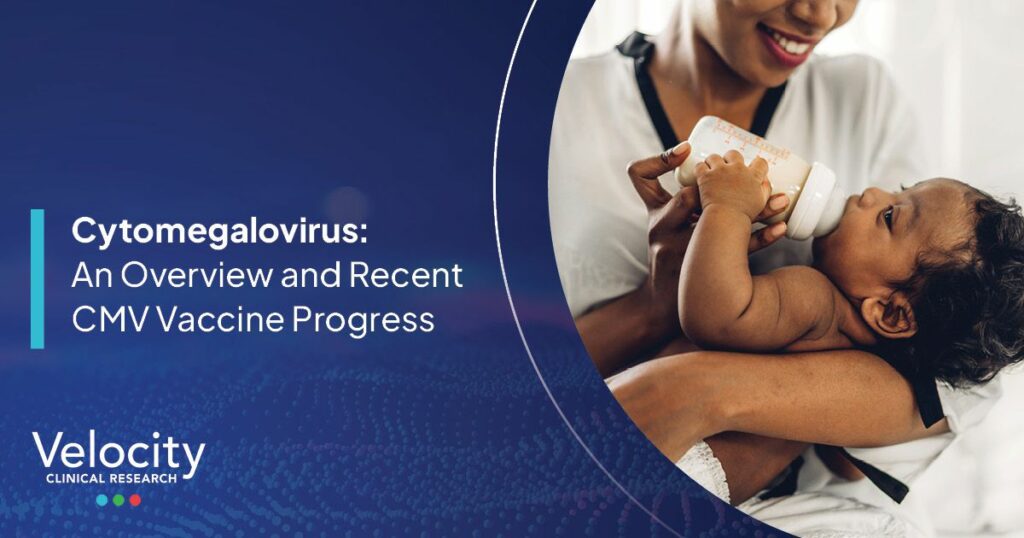About Cytomegalovirus (CMV)
You might not have heard of cytomegalovirus (pronounced site-oh-mega-low-virus), or CMV, but you’ve probably been infected with it. Over half of adults have been infected with CMV by age 40. While most CMV infections cause no symptoms, when a baby is born with a cytomegalovirus infection, known as congenital CMV, it can cause long-term health problems. About one out of every 200 babies is born with congenital CMV and almost one-fifth of all newborns with congenital CMV will face long-term health problems.
Symptoms and Illnesses Caused by CMV Infection
For most people, CMV infections cause minor symptoms, like a fever or sore throat, or no symptoms at all. However, several illnesses caused by CMV infection — including mononucleosis — can cause symptoms. The symptoms of mono can include fever, fatigue, sore throat, and swollen lymph nodes, which can cause hospitalization and even the rupture of the spleen. Another rare illness triggered by CMV is hepatitis, or inflammation of the liver. CMV causes illnesses most often in immunocompromised people. Some of those illnesses can affect the eyes, lungs, liver, esophagus, stomach, and intestines.
Congenital CMV does not usually cause illness or symptoms in babies, but occasionally, CMV infection in utero can seriously impact development of a fetus, resulting in hearing loss, developmental and motor delay, vision loss, microcephaly (small head), or seizures. Some babies born with CMV exhibit symptoms at birth including rash, jaundice (yellowing of the skin or whites of the eyes), microcephaly (small head), low birth weight, hepatosplenomegaly (enlarged liver and spleen), seizures, and retinitis (damaged eye retina). Additionally, some babies with no CMV symptoms at birth may have hearing loss. The hearing loss might be present at birth or may develop later, even in those who passed the newborn hearing test.
CMV Transmission: How it Spreads
CMV transmission most often occurs through bodily fluids, especially saliva. Sharing objects like toothbrushes and drinking glasses with an infected person can spread the virus. CMV can also spread through breast milk to nursing infants, blood and semen during sexual contact, blood transfusions, and organ transplantations.
Additionally, a pregnant woman can pass CMV to her unborn baby. Passing through the placenta, the virus in the mother’s blood can infect the baby during pregnancy. This can happen when a pregnant woman is either infected with CMV for the first time or is infected with CMV again during pregnancy.
Since CMV is a member of the herpesvirus family, like the Epstein-Barr virus (EBV), it can lay dormant in an infected individual’s body for years, and sometimes for life. Occasionally it reactivates, causing the previously mentioned symptoms. A person can also be re-infected with a different strain of the virus after being infected previously.
How to Tell if You’ve Had CMV
Serologic tests — blood tests looking for certain antibodies (ab) — can detect CMV antibodies. There are two main antibodies that can be detected in a CMV serologic test — ab IgG and ab IgM. A positive test for CMV IgG shows that a person has at one point become infected with CMV but cannot determine when specifically.
CMV IgM antibodies can help determine if the person receiving the test has only been infected with CMV once. If detected in combination with CMV IgG antibodies that bond weakly with the virus itself, most likely, the person has a primary CMV infection. If IgG bonds strongly to the virus, and CMV IgM is present, it is reasonable to assume there has been a prior CMV infection in the person receiving the test.
Clinical Trials and CMV Vaccine Development Progress
There are currently no approved Cytomegalovirus vaccines. However, some promising vaccine candidates are in clinical trials. A safe and effective vaccine could reduce the number of birth defects in newborns and mono hospitalizations by preventing a significant number of infections.
Velocity is currently conducting clinical trials for investigational CMV vaccines. The hope is that these early trials will demonstrate both safety and efficacy of this investigational vaccine.
CMV Clinical Trials at Velocity
If you’re interested in learning more about or participating in vaccine trial with Velocity, visit our find a study page to speak with a recruitment specialist.
More Information and References on CMV
About CMV, Centers for Disease Control and Prevention: https://www.cdc.gov/cmv/overview.html
Serological Tests for CMV, Centers for Disease Control and Prevention: https://www.cdc.gov/cmv/clinical/lab-tests.html
CMV and Hepatitis, National Center for Biotechnology Information: https://www.ncbi.nlm.nih.gov/pmc/articles/PMC4206484/
CMV Reinfection, National Center for Biotechnology Information: https://www.ncbi.nlm.nih.gov/pmc/articles/PMC5840099/

